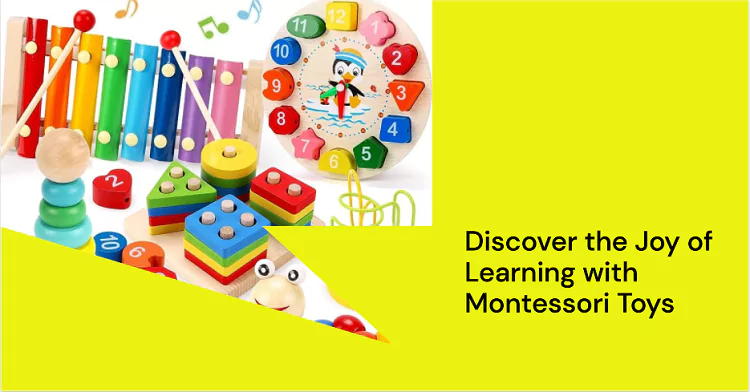As parents and educators, we all seek the best tools and resources to nurture the minds of young learners. In recent years, Montessori toys have gained significant popularity due to their unique approach to education and child development. These great toys do not just serve as ordinary playthings; they carefully craft them to promote learning, creativity, and cognitive growth. In this article, we will learn about toys that help kids learn and have fun as they grow.
What are Montessori Toys?
Montessori toys are educational play materials designed based on the principles of the Montessori educational approach. Dr. Maria Montessori, an Italian doctor and teacher, formulated this method in the early 20th century. Dr. Montessori thought that kids learn best through hands-on experiences and we should support their curiosity.
The Montessori Approach to Education
The Montessori method highlights autonomy, liberty within boundaries, and reverence for the child’s unique rate of development. In a Montessori classroom, teachers allow children to choose their activities, which promotes a sense of responsibility and self-discipline.
The Importance of Play in Early Childhood Development
Play is a crucial aspect of a child’s early development. It fosters creativity, social skills, and problem-solving abilities. Designers have created these toys to provide purposeful play, allowing children to explore and learn in a safe and engaging environment.
Characteristics of Montessori Toys
Montessori toys possess distinct characteristics that set them apart from conventional toys. They often consist of natural materials like wood and promote sensory exploration. Additionally, they promote open-ended play, allowing children to use their imagination and creativity freely.
Benefits of Montessori Toys
Cognitive Development
Montessori toys stimulate various cognitive functions, such as memory, attention, and reasoning. These toys challenge children to think critically and solve problems independently.
Motor Skills Enhancement
Through hands-on interactions with these toys, children develop their fine and gross motor skills. These toys help refine their hand-eye coordination and dexterity.
Problem-Solving Abilities
Montessori toys often present challenges that require problem-solving. By overcoming these challenges, children build confidence in their abilities to tackle obstacles.
Creativity and Imagination
Montessori toys encourage open-ended play, fostering creativity and imaginative thinking. Children can use the toys in various ways, empowering them to explore their own ideas.
Choosing the Right Montessori Toys
When selecting toys for a child, it’s essential to consider their age, interests, and developmental stage. Each toy should provide opportunities for learning and align with the child’s individual needs.
Popular Montessori Toys for Different Age Groups
Infants (0-12 months)
For infants, these toys focus on sensory exploration and motor skill development. Examples include soft rattles, tactile balls, and grasping toys.
Toddlers (1-3 years)
Toddlers benefit from best montessori toys for babies that enhance their problem-solving abilities and coordination. Montessori puzzles, nesting blocks, and sorting games are excellent choices.
Preschoolers (3-6 years)
Preschoolers engage in imaginative play and language development. Montessori toys like pretend play sets, building blocks, and art materials support their growth.
Elementary School Children (6-12 years)
For older children, Montessori toys can include science kits, mathematical manipulatives, and geography puzzles, encouraging exploration of academic subjects.
DIY Montessori Toys: Fun and Budget-Friendly Ideas
Creating Montessori-inspired toys at home is a rewarding experience for both parents and children. Simple activities such as sensory boxes, homemade modeling clay, and do-it-yourself puzzles can be affordable and efficient options.
Integrating Montessori Toys into Learning Environments
Classrooms do not limit these toys; they can also seamlessly integrate into home learning spaces. A thoughtfully prepared environment with these toys can enhance a child’s learning experience.
The Future of Montessori Toys: Innovations and Trends
As education continues to evolve, so will these toys. Innovations in technology and sustainable materials will shape the future of these educational playthings.
Montessori Toys and Sustainable Practices
Sustainability is becoming a significant concern for consumers. We explore how Montessori toy manufacturers are adopting eco-friendly practices to contribute positively to the environment.
Tips for Parents and Educators: Maximizing the Benefits of Montessori Toys
To maximize the benefits of Montessori toys, parents and educators should actively engage with children. You can do this by playing with them, asking questions, and observing their progress.
Conclusion
Montessori toys (https://woollyfox.net/collections/montessori-toys) offer a captivating journey of discovery and learning for young minds. These carefully crafted play materials not only foster cognitive development and motor skills but also ignite a lifelong love for learning. By using Montessori principles and appropriate toys, we can help children grow and succeed in a fun and educational way.

Mark Thompson, a seasoned pest controller, is renowned for his expertise in keeping homes and businesses free from unwanted intruders. With a passion for environmental sustainability and a deep understanding of pest behavior, Mark has become a trusted authority in the industry.
